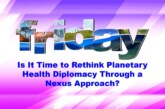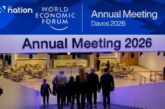By FGR Bureau
Cover page of the 2019 edition of the World Water Development Report (WWDR 2019) entitled ‘Leaving No One Behind’.
 Launching of the World Water Development Report (WWDR) 2019 was facilitated on 19 March 2019 at the Human Rights Council, at the Palais des Nations in Geneva (Switzerland), The 2019 WWDR is designed to seek to inform policy and decision-makers, inside and outside the water community, how improvements in water resources management and access to water supply and sanitation services are essential to overcoming poverty and addressing various other social and economic inequities. Broadly speaking, the impacts of water-related decisions often transcend geographic boundaries and affect everyone in this increasingly globalized world. Many experts have argued that in the current era of the ongoing process of climate change, extreme weather events, environmental degradation, population growth, rapid urbanization, unsustainable and inequitable consumption patterns, conflicts and social unrest, and unprecedented migratory flows are among the interconnected pressures faced by humanity, often hitting those in vulnerable situations the hardest through their impacts on water.
Launching of the World Water Development Report (WWDR) 2019 was facilitated on 19 March 2019 at the Human Rights Council, at the Palais des Nations in Geneva (Switzerland), The 2019 WWDR is designed to seek to inform policy and decision-makers, inside and outside the water community, how improvements in water resources management and access to water supply and sanitation services are essential to overcoming poverty and addressing various other social and economic inequities. Broadly speaking, the impacts of water-related decisions often transcend geographic boundaries and affect everyone in this increasingly globalized world. Many experts have argued that in the current era of the ongoing process of climate change, extreme weather events, environmental degradation, population growth, rapid urbanization, unsustainable and inequitable consumption patterns, conflicts and social unrest, and unprecedented migratory flows are among the interconnected pressures faced by humanity, often hitting those in vulnerable situations the hardest through their impacts on water.
Finding appropriate solutions to the inequalities confronting the marginalized and disadvantaged groups call for tailored solutions that take account of the day-to-day realities of people and communities in vulnerable situations. Some experts are of the view that suitably designed and effectively implemented policies, efficient and appropriate use of financial resources, as well as evidence-based knowledge on water resources and water-related issues are also vital to eliminating inequalities in access to safe drinking water and sanitation.
The theme of the 2019 World Water Development Report on “No One is Left Behind” reiterates the commitments made by the UN member states in adopting the 2030 Agenda for Sustainable Development and in recognizing the human rights to safe drinking water and sanitation, both of which are essential for eradicating poverty and for building prosperous, peaceful societies. It is widely acknowledged now that improved water resources management and access to safe water and sanitation for all is a sine qua non for eradicating poverty, building peaceful and prosperous societies, and ensuring inclusiveness on the road towards sustainable development.
 Worldwide increase in usage of water by about 1% per year since the 1980s has been reported. This increase is driven by a combination of factors like population growth, socio-economic development and changing consumption patterns. Broad estimates show that global water demand is expected to continue increasing at a similar rate until 2050, accounting for an increase of 20 to 30% above the current level of water use, mainly due to rising demand in the industrial and domestic sectors. Lamentably, over 2 billion people live in countries experiencing high water stress, and about 4 billion people experience severe water scarcity during at least one month of the year. Increasing growth in demand for water coupled with the fact of the vagaries of climate change, stress levels of water are bound to grow.
Worldwide increase in usage of water by about 1% per year since the 1980s has been reported. This increase is driven by a combination of factors like population growth, socio-economic development and changing consumption patterns. Broad estimates show that global water demand is expected to continue increasing at a similar rate until 2050, accounting for an increase of 20 to 30% above the current level of water use, mainly due to rising demand in the industrial and domestic sectors. Lamentably, over 2 billion people live in countries experiencing high water stress, and about 4 billion people experience severe water scarcity during at least one month of the year. Increasing growth in demand for water coupled with the fact of the vagaries of climate change, stress levels of water are bound to grow.
|
Safe drinking water and Sanitation are recognized as basic human rights, as they are indispensable to sustaining healthy livelihoods and fundamental in maintaining the dignity of all human beings. |
Launching of the 2019 WWDR took place on 19 March 2019 during the 40th session of the United Nations Human Rights Council (UNHRC), and in conjunction to the World Water Day, which aptly demonstrates as to how improvements in water resources management and access to water supply and sanitation services are necessary for addressing various social and economic inequities, such that ‘no one is left behind’ when it comes to enjoying the multiple benefits and opportunities that water provides. Safe drinking water and Sanitation are recognized as basic human rights, as they are indispensable to sustaining healthy livelihoods and fundamental in maintaining the dignity of all human beings.
All member states of the United Nations are obligated under international human rights law to work towards attaining universal access to water and sanitation for all, without discrimination, while prioritizing those most in need. Fulfillment of the human rights to water and sanitation requires that the services be available, physically accessible, equitably affordable, safe and culturally acceptable. It is with this motive that 2019 WWDR has chosen the theme of ‘Leaving no one behind’ because this theme is at the heart of the commitment of the 2030 Agenda for Sustainable Development, which aims to allow all people in all countries to benefit from socio-economic development and to achieve the full realization of human rights.



